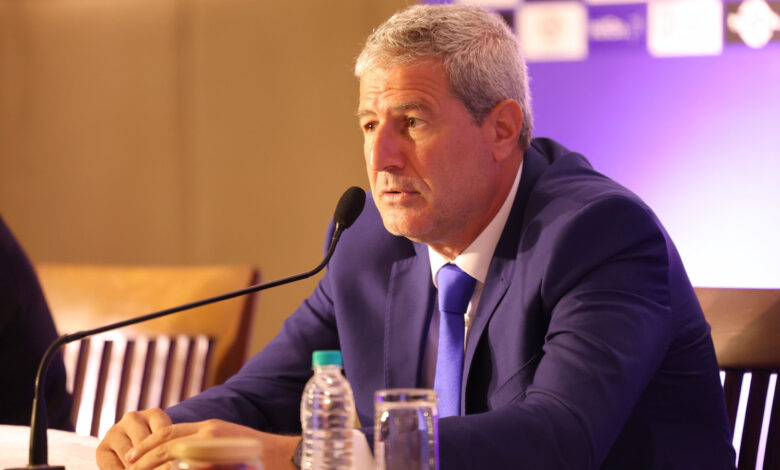India football coach Manolo Marquez keen on raising standard of Indian players than lofty World Cup ambitions | Football News

Manolo Marquez in his first press conference as the Indian national head coach of the senior football team made it clear that FIFA World Cups and AFC Asian Cups were a dant dream, and raising the standards of Indian players was how he would want to rate how successful his stewardship would be at the end of his three-year tenure.Marquez, who will coach both the Indian team and FC Goa in his first season, and then transition full-time to the national setup, was brought in due to his success in developing Indian players at the Indian Super League level. The All-India Football Federation’s hiring was not based on international experience, but rather Marquez’s knowledge of Indian footballers and how to develop them. His hiring was also a no-brainer considering the poor financial situation of the current AIFF – the reason coaches with international pedigree were not chosen after over 200 applicants made it clear it was a job still worth pursuing.
He takes over after a particularly turbulent exit former coach Igor Stimac. Stimac’s exit took place after the Croatian was unable to take India into the third round of the World Cup qualifiers, a result that the AIFF says forced it to sack the 56- year-old. Stimac had said that the sacking was not legal and he would be approaching the FIFA tribunal over his full contract not being paid out the federation in India. Stimac’s time with Indian football was filled with his complaints over the quality of the Indian Super League, and how important positions were being filled foreign players and how he wasn’t given enough camps before big tournaments.
It’s about more than winning; it’s about growth. I don’t like excuses I like results 🗣️ @2014_manel #IndianFootball ⚽️ #meetmanolo pic.twitter.com/CkwctFWMF7
— Indian Football Team (@IndianFootball) August 11, 2024
Marquez’s first test would be the Intercontinental Cup, an international tournament being held in India. Whether ISL clubs release players for the tournament and allow the Spaniard to take stock of what resources he has at his disposal, is uncertain. The start of the ISL season, as well as the Durand Cup mean that his first FIFA window is already going to see limited participation. But the Spaniard assured that there ‘will be 11 players on the pitch’ at the press conference on Sunday.
“We will have six, seven games before the first qualifier in March. Let’s see what happens in the first FIFA window before the ISL starts. In this situation, we are playing friendly matches and need to prepare for more important matches ahead. And we can’t forget we need to be in Pot 1 before December’s draw,” said Marquez about utilising the FIFA windows before the Asian Cup qualifiers begin.
He then added that it was not about the quality or potential of a player, but rather how that quality fits into the overall dynamic of the team. “It’s about preparation and to find the correct people to grow as a team. We need players who play for the team, and not individually. You have to find the correct players, not just 11 but the whole group of 20 to 25. Everyone needs to know their role in the team and we need to play in the style that we want,” said Marquez.
🎙️ @2014_manel emphasizes that talent is everywhere, but only the best shine under pressure.#IndianFootball⚽️ #meetmanolo pic.twitter.com/CiANpN0Krs
— Indian Football Team (@IndianFootball) August 11, 2024
Sunil Chhetri’s retirement also opens up the search for a striker – a tough ask considering the top league in India rarely sees clubs allowing Indian players to play in crucial positions on the pitch. While Chhetri himself in the last few years wasn’t able to produce the output of goals internationally in crucial competitions, the way things are in India’s top league, the national team might be one of the few places where strikers might get some game time in their natural positions.
The Spaniard said that a widening of the talent pool could fix the issue, adding that players needed to go abroad, even to lower divisions, in order to get better. But the issue with that has forever been that most players earn more money in India, than they would in lower divisions in European football and thus prefer to stay within the leagues in the country.
But the one area where Marquez said that the players coming in would have to become stronger is in their mentality. At the Asian Cup, and most international games, Indian players have often been subject to naïve decision-making – be it earning a foul, or keeping control of the ball in the midfield, or even not recognising the momentum shifts in a game and acting accordingly. There is also the issue of India not being able to beat teams like Bangladesh and Afghanan in international qualification stages – an area that has stopped them from progressing in Asia, as they would have believed themselves to be capable of.
“We have to be stronger mentally. In football, technique is very important. Tactics are very important. Physical condition is very important, but if the head doesn’t work, you can do nothing in life, not just football. For example, if you start a game losing 0-2 in the minute 20, you still have 70 minutes to turn the score and it is possible. This is the mentality. In the national team, theoretically, we’ll play the best players in the country. Then if the mentality is correct, we will get good things with good results,” said Marquez.



